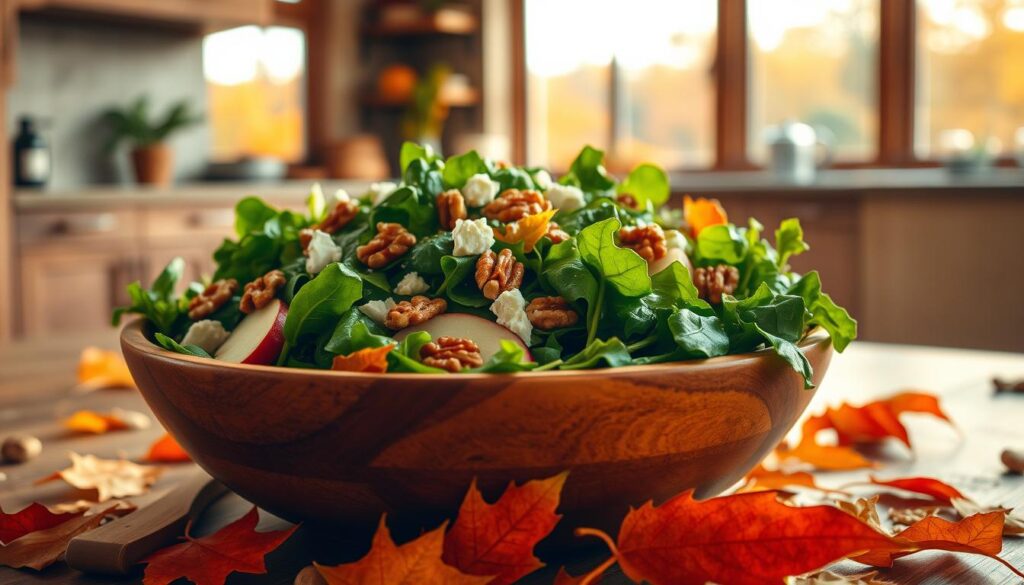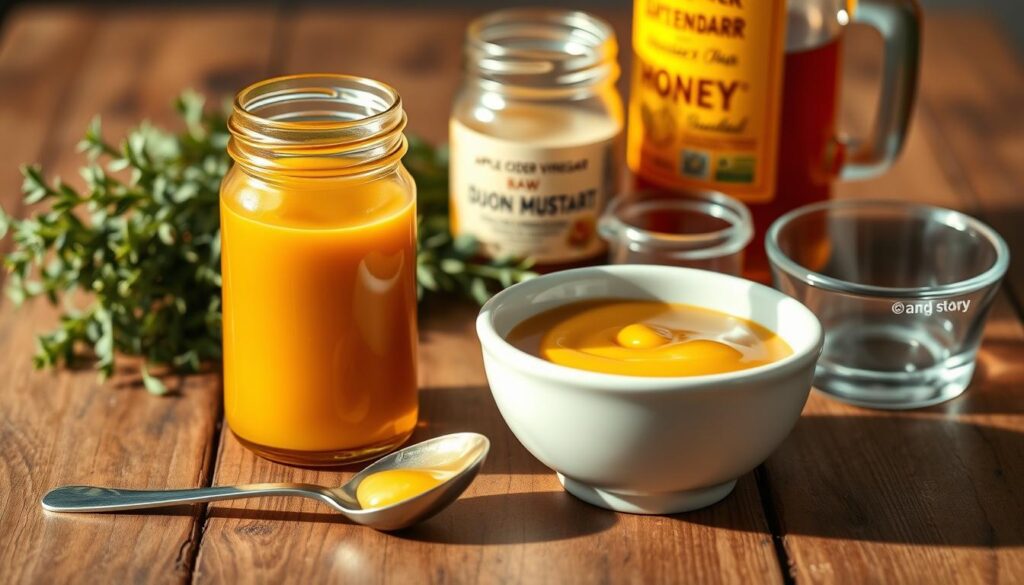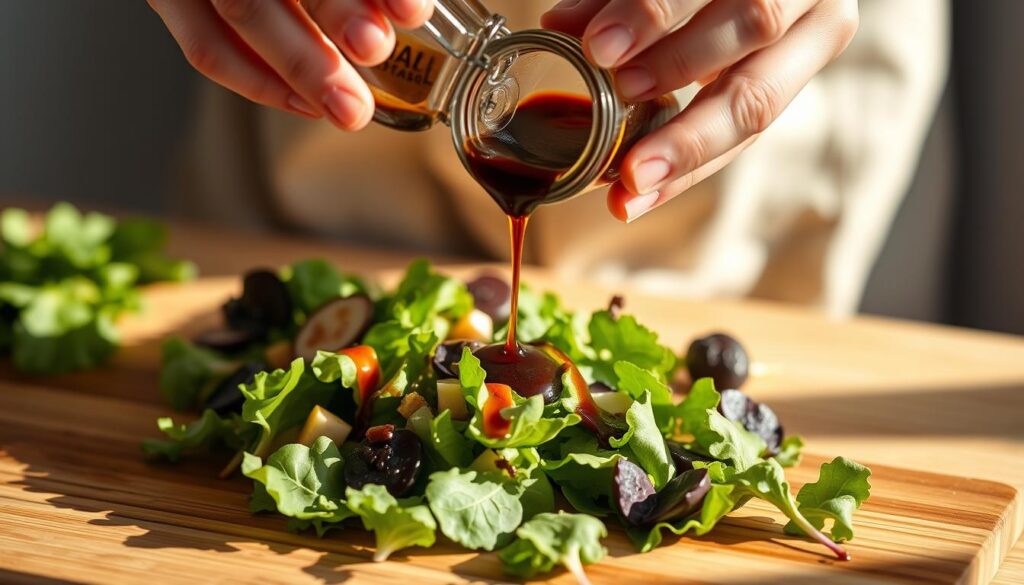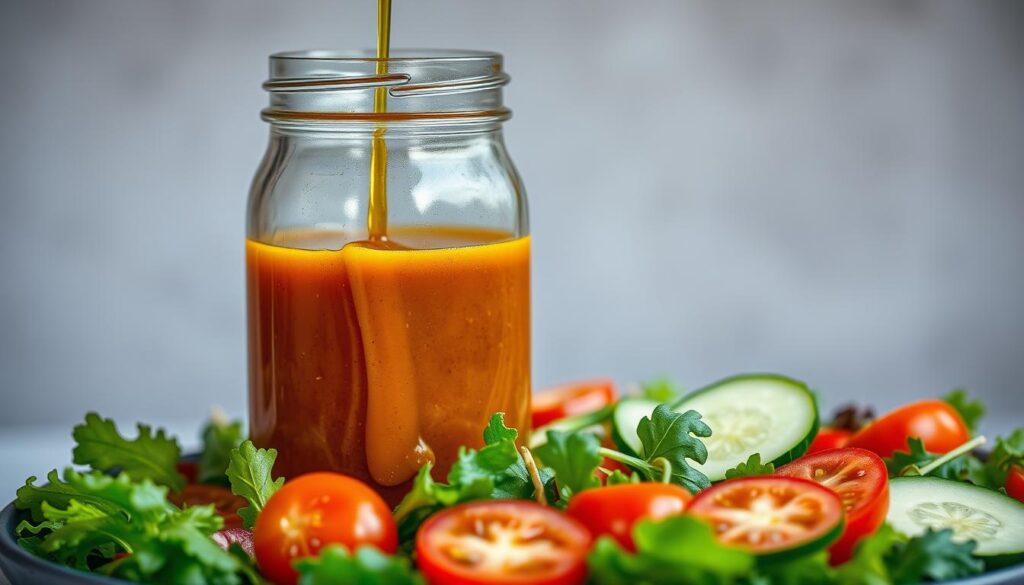Maple syrup adds magic to salad dressings, turning simple meals into special ones. This golden syrup from Vermont’s forests adds a deep flavor. It makes ordinary salads into gourmet dishes.
Chefs and home cooks love maple syrup for its unique flavor. It balances dressing flavors and is a sweet alternative to processed sugars. This makes vibrant vinaigrettes that excite your taste buds.
Maple syrup does more than just sweeten salad dressings. It has flavors from caramel to woodsy notes. These flavors match well with fresh greens, roasted veggies, and grain salads.
Every bottle of maple syrup comes from a long tradition. Sugarmakers tap maple trees in winter and early spring. They get a liquid that adds natural complexity to food.
Maple syrup is great for any salad, from light summer ones to hearty autumn dishes. It works well with vinegars, mustards, and herbs. This makes dressings that are both surprising and delightful.
Understanding the Magic of Maple Syrup in Dressings
Maple syrup turns simple salad dressings into amazing dishes. It’s a top choice for making tasty and healthy dressings. These dressings make any meal special.
Natural Sweetness Reimagined
Maple syrup is different from fake sweeteners. It has a rich flavor that fake sugars can’t match. Pure maple syrup adds depth and richness to dressings.
- 100% natural sweetening agent
- Richer taste compared to artificial sweeteners
- Provides nuanced flavor layers
Nutritional Powerhouse
Pure maple syrup is not only tasty but also full of nutrients. Maple syrup uses in salad dressings add more than just flavor. They bring important minerals and antioxidants for better health.
- Contains zinc and manganese
- Rich in antioxidants
- Lower glycemic index than refined sugar
Flavor Profile Enhancement
Maple syrup makes salad dressings better by balancing flavors. Its natural complexity goes well with both sweet and savory ingredients. This creates perfect dressing combinations.
Maple syrup transforms ordinary dressings into extraordinary culinary experiences.
Maple syrup is great for all kinds of dressings, from vinaigrettes to creamy ones. It’s a versatile choice for home cooks wanting to make their salads better with natural flavors.
Essential Tips for Creating Perfect Maple Vinaigrette
Making a tasty maple vinaigrette needs care and knowing how to balance flavors. The secret to a great maple vinaigrette is using top-notch ingredients and learning how to mix them right.
- Choose pure maple syrup for authentic flavor
- Select high-quality vinegars like apple cider or balsamic
- Use cold-pressed oils for optimal taste
- Experiment with herb combinations
The best maple vinaigrette ratio is:
| Ingredient | Proportion |
|---|---|
| Maple Syrup | 2 parts |
| Vinegar | 3 parts |
| Olive Oil | 4 parts |
Getting the mix right is key for a smooth vinaigrette. Whisk hard or blend to get a uniform texture. Slowly add oil while mixing to avoid separation.
Adding herbs like thyme, rosemary, or sage can make your vinaigrette stand out. Begin with a little and adjust to your liking.
Classic Maple Balsamic Dressing Recipe
Making delicious Maple Balsamic Dressing at home is simple. It turns regular salads into fancy dishes with its deep flavors.
The secret to great Maple Balsamic Dressing is using top-notch ingredients. Knowing how to pick the right ingredients makes your homemade dressing truly special.
Ingredient Selection Guide
To make an amazing Maple Balsamic Dressing, start with the best ingredients. Here’s what you’ll need:
- Maple Syrup: Pick pure, Grade A dark amber maple syrup for a strong taste
- High-quality balsamic vinegar
- Extra virgin olive oil
- Dijon mustard
- Fresh herbs (optional)
Step-by-Step Mixing Instructions
- Whisk maple syrup and balsamic vinegar in a bowl
- Slowly drizzle olive oil while whisking
- Add Dijon mustard for mixing
- Season with salt and pepper to taste
- Optional: Mix in finely chopped fresh herbs
Storage and Shelf Life Tips
Storing your Maple Balsamic Dressing right keeps its flavor and quality.
| Storage Method | Duration | Recommendation |
|---|---|---|
| Refrigerated (Sealed Container) | 1-2 weeks | Best quality preservation |
| Room Temperature | 3-4 days | Not recommended |
Pro tip: Store your Maple Balsamic Dressing in a glass jar with a tight lid. This keeps it fresh and prevents flavors from mixing.
Crafting the Perfect Maple Dijon Dressing
Making a tasty Maple Dijon Dressing is all about finding the right mix of sweet and tangy. It blends the deep flavor of pure maple syrup with the sharpness of Dijon mustard. This combo turns simple salads into something truly special.
For a top-notch Maple Dijon Dressing, you’ll need:
- High-quality pure maple syrup
- Smooth Dijon mustard
- Extra virgin olive oil
- Apple cider vinegar
- Fresh herbs (optional)
The trick to a great Maple Dijon Dressing is getting the flavors just right. Begin with a 2:1 mix of maple syrup to Dijon mustard. Then, tweak it to your liking. Adding a bit of garlic or minced shallots can make it even better.
To get a smooth dressing, whisk everything together well. Use room temperature ingredients and whisk hard until it’s creamy and well-mixed.
Here are some salads that go great with Maple Dijon Dressing:
- Autumn harvest salads with roasted butternut squash
- Mixed green salads with goat cheese
- Kale and apple salads
- Roasted beet and walnut salads
For storing, put your Maple Dijon Dressing in an airtight container in the fridge for up to a week. Always shake or whisk it before using to mix everything back together.
Maple Syrup Uses in Salad Dressings: A Complete Guide
Maple syrup turns simple salad dressings into amazing dishes. Both professional chefs and home cooks love using it. It makes ordinary salads into gourmet treats.
Learning to use maple syrup in salad dressings is an art. It needs attention to detail and creative skills.
Proper Ratios and Measurements
Making the perfect maple syrup salad dressing is all about precision. The right mix is usually:
- 2-3 tablespoons of maple syrup per 1/2 cup of dressing base
- Adjust sweetness based on accompanying ingredients
- Consider vinegar or acid content when balancing flavors
Complementary Ingredients
Maple syrup goes well with many ingredients, making flavors rich and complex:
| Ingredient Category | Recommended Pairings |
|---|---|
| Oils | Olive oil, walnut oil, avocado oil |
| Acids | Apple cider vinegar, balsamic vinegar |
| Herbs | Thyme, rosemary, sage |
Seasonal Applications
Maple syrup salad dressings are perfect for any season. Try fresh, local ingredients to make dressings that match the season.
- Spring: Light dressings with fresh herbs
- Summer: Bright, citrus-infused variations
- Fall: Rich, warming dressings with roasted nuts
- Winter: Hearty dressings featuring root vegetables
Learning to use maple syrup in salad dressings is a creative journey. It lets home cooks make unique, tasty dressings that impress everyone.
Maple Walnut Dressing for Fall Salads

Autumn is the perfect time to make your salads special with Maple Walnut Dressing. This dressing turns simple greens into a gourmet delight. It celebrates the rich flavors of fall.
To make the best Maple Walnut Dressing, choose high-quality ingredients. Pick premium maple syrup and fresh, crunchy walnuts. This ensures the dressing tastes great and is good for you.
- Toast walnuts to enhance their natural richness
- Use cold-pressed walnut oil for depth of flavor
- Select pure maple syrup from local producers
Maple syrup and walnuts are nutritional powerhouses. They make a dressing full of antioxidants and healthy fats. The dressing’s sweet maple and earthy walnut flavors are perfect for autumn salads.
| Ingredient | Nutritional Benefit | Flavor Profile |
|---|---|---|
| Maple Syrup | Rich in Antioxidants | Sweet, Caramel-like |
| Walnuts | Omega-3 Fatty Acids | Nutty, Robust |
Try Maple Walnut Dressing with roasted butternut squash, crisp apple slices, and mixed greens. It adds warmth and depth to your autumn meals.
“A great dressing transforms a simple salad into a culinary masterpiece.” – Chef’s Wisdom
Play with the Maple Walnut Dressing by changing the syrup-to-walnut ratio. Each batch can be a unique way to celebrate fall’s harvest.
Refreshing Maple Raspberry Vinaigrette
Take your salad to the next level with Maple Raspberry Vinaigrette. It combines maple syrup’s sweetness with raspberries’ tartness. This dressing turns simple greens into a feast for your taste buds and body.
Making the perfect Maple Raspberry Vinaigrette is all about the right ingredients and technique. It’s about finding the right mix of flavors that make it stand out.
Selecting the Perfect Berries
Choosing the right raspberries is key for Maple Raspberry Vinaigrette. Here are some tips:
- Look for ripe, deep red raspberries with a glossy look
- Go for fresh berries in summer
- Frozen raspberries are great for making dressing all year
- Opt for organic berries for the best flavor
Balancing Sweet and Tart Flavors
The secret to Maple Raspberry Vinaigrette is mixing sweet and tart. Maple syrup adds sweetness, while raspberries add a tangy kick.
A great Maple Raspberry Vinaigrette balances sweet and tart, creating a flavor symphony.
To get the perfect mix, start with a 2:1 ratio of maple syrup to raspberry puree. Adjust to taste. Adding a bit of apple cider vinegar can make it even more complex and refreshing.
Creating Creamy Maple Poppy Seed Dressing
Making a tasty Maple Poppy Seed Dressing can turn simple salads into amazing dishes. It mixes the sweet taste of maple syrup with the crunchy poppy seeds. This mix makes a dressing that makes any salad better.
The key to a great Maple Poppy Seed Dressing is using top-notch ingredients. Start with a creamy base for a smooth and rich texture. Greek yogurt or mayonnaise are great choices, as they stick well to greens.
- Choose pure maple syrup for authentic sweetness
- Select fresh poppy seeds for maximum flavor
- Use high-quality yogurt or mayonnaise as a base
- Balance sweet and tangy flavors carefully
Here are some important tips for making your Maple Poppy Seed Dressing:
- Whisk ingredients well to mix them smoothly
- Add maple syrup slowly to control how sweet it is
- Put poppy seeds in last for the best texture
- Chill it to let the flavors mix well
Great ways to use this dressing include on green salads, coleslaw, and fruit salads. Its sweet taste goes well with both light greens and hearty winter veggies.
Pro tip: For best results, use freshly ground poppy seeds and pure maple syrup from local producers.
Try different amounts of each ingredient to find your favorite flavor. The beauty of this recipe is how you can make it your own.
Maple Honey Mustard Dressing Variations
Making the perfect Maple Honey Mustard Dressing is all about choosing the right ingredients. It turns simple salads into works of art with its rich flavor.

The secret to a great Maple Honey Mustard Dressing is using top-notch ingredients. The type of mustard you pick can change the dressing’s taste a lot.
Selecting Your Mustard
Choosing the right mustard is key to a fantastic Maple Honey Mustard Dressing. Here are some options:
- Dijon Mustard: Sharp and tangy, it adds a strong flavor
- Whole Grain Mustard: It brings texture and a rustic feel
- Honey Mustard: It’s smoother and sweeter
Harmonizing Honey and Maple Syrup
Getting the honey and maple syrup right adds depth to your dressing. Each sweetener has its own special taste:
- Pure maple syrup has a woodsy, complex sweetness
- Honey adds floral, lighter notes
- Try different ratios, like 2:1 or 1:1, to find your favorite mix
The perfect Maple Honey Mustard Dressing blends these elements beautifully. It makes any salad or dish taste better.
Best Salad Combinations for Maple Dressings
Maple syrup in salad dressings opens a world of creativity. It turns simple salads into amazing dishes. Maple-based dressings offer endless tasty combinations that excite our taste buds.
To make the perfect maple syrup salad, you need to know about flavors and how they mix. Here are some top salad mixes that go great with maple dressings:
- Autumn Harvest Salad: Roasted butternut squash, crisp apple slices, candied pecans, and mixed greens
- Summer Fresh Salad: Grilled chicken, fresh berries, goat cheese, and baby spinach
- Winter Warmth Salad: Roasted beets, caramelized walnuts, arugula, and crumbled blue cheese
The secret to amazing maple syrup salad dressings is finding the right mix of sweet, savory, and crunchy. Keep these tips in mind when making your maple-dressed salad:
- Choose greens with strong flavors like arugula or kale
- Add protein for substance (grilled chicken, salmon, or tofu)
- Include crunchy elements like toasted nuts or seeds
- Incorporate fresh or roasted fruits for natural sweetness
Try out different maple dressing styles – from light vinaigrettes to creamy ones. Find your favorite salad mix. Maple syrup’s natural sweetness adds depth and complexity to every bite.
Seasonal Ingredients that Complement Maple Dressings
Making the perfect maple vinaigrette means knowing how to use seasonal ingredients. Each season brings unique flavors and textures. These pair well with the sweet taste of maple-based dressings.
Maple vinaigrette turns simple salads into amazing dishes. It highlights the best produce of each season. This dressing lets home cooks make fresh, vibrant meals all year.
Spring and Summer Flavor Combinations
In warmer months, light and fresh ingredients are perfect with maple vinaigrette:
- Fresh strawberries and spinach
- Grilled peaches with arugula
- Crisp cucumber and tender butter lettuce
- Ripe cherry tomatoes with mixed greens
Fall and Winter Hearty Pairings
Cooler seasons need strong ingredients that match the maple vinaigrette’s richness:
- Roasted butternut squash
- Caramelized Brussels sprouts
- Warm quinoa with roasted root vegetables
- Kale and winter citrus salads
“A great maple vinaigrette adapts to the season’s bounty, transforming simple ingredients into memorable meals.”
Knowing how to pair seasonal ingredients with maple vinaigrette makes for exciting salads. This way, home chefs can enjoy the versatility of maple vinaigrette all year.
Troubleshooting Common Maple Dressing Issues

Making the perfect Maple Balsamic Dressing can be tricky. Knowing how to fix common problems will help you make a tasty dressing every time.
Separation and Emulsification Challenges
Maple Balsamic Dressing often has trouble staying mixed. The solution is to whisk it well:
- Use a wire whisk or blender for thorough mixing
- Add ingredients gradually to ensure consistent texture
- Incorporate a small amount of mustard as an emulsifier
Balancing Flavor Profiles
Getting the flavors just right is key for a great Maple Balsamic Dressing. If it tastes too sweet or tart, try these tips:
- Add a pinch of salt to cut excessive sweetness
- Introduce acid (like apple cider vinegar) to brighten overly sweet dressings
- Experiment with herb combinations to enhance complexity
“The secret to a perfect dressing is patience and careful tasting.” – Professional Chef
How you store your Maple Balsamic Dressing matters too. Always keep it in an airtight container in the fridge. Use it within a week for the best taste and texture.
Health Benefits of Maple-Based Dressings
Maple syrup is more than a sweetener; it’s a nutritional powerhouse. It can turn your Maple Dijon Dressing into a health-boosting condiment. It’s full of essential minerals and antioxidants, giving you more than just flavor.
Maple syrup’s nutritional profile makes it a great choice for salad dressings. Unlike refined sugars, it has:
- Zinc for immune support
- Manganese for bone health
- Antioxidants that fight cellular damage
- Trace amounts of calcium and potassium
When making a Maple Dijon Dressing, you’re adding more than sweetness. You’re adding a nutrient-dense ingredient. The mix of maple syrup, heart-healthy olive oil, and protein-rich mustard makes a balanced dressing. It supports your overall wellness.
For those watching calories, here are some tips:
- Use maple syrup sparingly
- Choose dark maple syrup for more intense flavor
- Pair with low-calorie, nutrient-rich greens
- Opt for homemade dressings to control ingredients
Pro tip: A little Maple Dijon Dressing goes a long way in adding flavor and nutrition to your meals.
Storage and Preservation Methods
Keeping your homemade Maple Walnut Dressing fresh is key. The right container and temperature tips can help. This way, your dressing stays tasty and flavorful.
Choosing the right container is important. Glass containers with tight lids are best. They keep your dressing fresh and prevent flavors from mixing.
Container Recommendations
- Use clear glass jars with airtight lids
- Opt for containers with wide mouths for easy pouring
- Choose BPA-free plastic containers as an alternative to glass
- Select containers that are dishwasher-safe for easy cleaning
Temperature Guidelines
Temperature is key for your Maple Walnut Dressing. Refrigeration keeps it fresh and stops bacteria.
- Store Maple Walnut Dressing in the refrigerator at 40°F or below
- Keep dressing away from the refrigerator door to maintain consistent temperature
- Use within 7-10 days for optimal freshness
- Always check for signs of spoilage before use
Pro tip: If your Maple Walnut Dressing separates, shake the container well. For the best taste, let it come to room temperature before serving.
Conclusion
Maple syrup makes salad dressings truly special. It adds depth and complexity to homemade dressings, from classic Maple Honey Mustard to new vinaigrettes. Exploring maple-infused recipes opens up a world of flavors beyond usual condiments.
Making the perfect Maple Honey Mustard Dressing is all about finding the right balance. Home cooks can create amazing flavors by trying different maple syrup grades and ingredients. Maple syrup’s versatility lets you get creative, making simple salads into gourmet meals.
Maple-based dressings are a mix of nutrition and flavor. They offer health benefits and taste great, whether in a light spring salad or a hearty winter mix. This article shares tips and insights for using maple syrup in dressings.
Using maple syrup in salad dressings is more than just cooking. It’s celebrating natural ingredients and creativity in the kitchen. These dressings bring together tradition, health, and culinary innovation at the dinner table.



